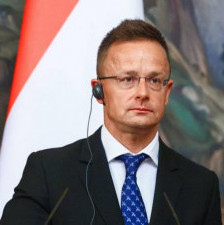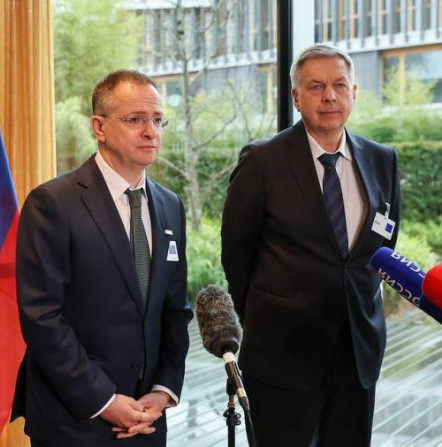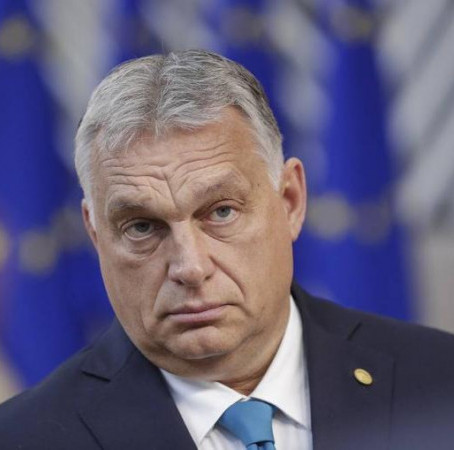An informal summit of the Community of Independent States was held in the suburbs of St.-Petersburg. Heads of all 12 CIS states came to the Konstantin Palace in Strelnya.
For Dmitry Medveded it was a debut in the family of his CIS colleagues. By the way, new Armenian President Serzh Sarkisian was another “newcomer” at the meeting. The summit started with a plenary session. Likewise in 2007, the meeting of the presidents preceded the Petersburg International Economic Forum.
Besides the plenary session devoted to the economic cooperation in the framework of the CIS, the heads of state had a number of bilateral meetings and talks.
The first president who visited Dmitry Medvedev was President of Moldavia Vladimir Voronin. He advised the Russian President that the Moldavian special services succeeded in finding two pictures from the Hermitage stolen from the museum in 2006. Voronin said with pleasure: “We confiscated them, now they are used in the investigation, and later we will return them to you, to the Hermitage”.
Meanwhile, the important and most urgent talks were expected with the presidents of Ukraine and Georgia.
Victor Yuschenko entered in the Oval Hall of the Palace immediately after Voronin. The agenda of the talks included prospects of Black Sea Fleet presence in Sevastopol, aspirations of Ukraine to NATO, notorious gas problems, etc. The President of Ukraine out of hand expressed his confidence that all problems will be definitely solved.
According to Russian Foreign Minister Sergey Lavrov speaking to journalists, Dmitry Medvedev warned the Ukrainian leader that the aspirations of Ukraine to NATO violate the provision of the Friendship and Cooperation Treaty stipulating that neither of the states shall make a threat to security of the other state.
Moscow also is not satisfied with unilateral steps of Kiev in the situation relating the Black Sea Fleet. Lavrov emphasized: “The Treaty provides for a possibility to extend the presence of the Black Sea Fleet. To prepare withdrawal of the Black Sea Fleet nine years before expiration of the term – it is not an approach we would like to see on the part of our partners”.
And finally the parties discussed the gas price. Medvedev reminded to Yuschenko that from 2009 the gas deals will be revised again. Transition of Turkmenistan to a European gas pricing scheme assumes that the price of “the blue fuel” for Ukraine will increase two-fold as from January 1, because a significant part of the Ukrainian gas balance is represented by the Central Asian gas.
The second important meeting expected by news agencies not less than the forum itself was held after a small working lunch. Dmitry Medvedev had a meeting with President Saakashvili.
Both leaders demonstrated their intention at least to make an effort to ease tension in the situation around Abkhazia and South Ossetia. The Rossiyskaya Gazeta published an abstract from the dialogue of two leaders: “I think we ourselves will be able to resolve all issues we face today, overcome difficulties and find long-term solutions [to those problems]. What do you think?” Dmitry Medvedev asked his Georgian counterpart, Mikheil Saakashvili. “I think there are no issues that can not be resolved; there are many unresolved problems, but there are no problems that will be impossible to resolve. Every [problem] can be resolved if there is goodwill and mutual understanding. The today’s situation is artificial. There are principle issues; accumulated issues, which I hope we will resolve”, Saakashvili answered.
Nevertheless no particular decisions have been taken. Russian Foreign Minister Sergey Lavrov said after the meeting that the Russian party has sent the ball to the Georgian side. Moscow let the Georgian leader see that it is interested in Georgia being a strong country but in so doing, solution of the Georgian-Abkhaz conflict should be found on the basis of the return to the international mechanisms.
It was claimed to the Georgian party that Georgian membership in NATO cannot provide for solution of the South-Ossetia and Abkhazia problems. Lavrov said: “”Expansion of NATO will provoke new confrontation in the region. It will entail new bloodshed”. In the opinion of the Russian party it is necessary to sign an agreement on non-use of force in resolution of the conflicts in South Ossetia and Abkhazia as soon as possible. Then it is necessary to promote practical cooperation in economic and social rehabilitation of the regions. Medvedev explained to Saakashvili that it was a sole motive for recent sending of military railway engineers to Abkhazia.
The marathon of bilateral talks ended with Dmitry Medvedev’s meetings with President of Uzbekistan Islam Karimov and new Head of Armenia Serzh Sarkisian. Then followed the plenary session.
In his address Dmitry Medvedev emphasized that the economic cooperation is a key priority of the CIS activities. In this connection the Russian leader supported the Kazakhstan/Kirgizia-proposed agenda of the Summit 2009 – the energy economy. Today the Community states possess about 18 per cent of all demonstrated reserves of crude oil and gas condensate. So, it was proposed that the energy topic would be specified and included in the agenda of the next CIS summit as a priority item. The summit is scheduled for September 26 in Bishkek.
For Dmitry Medveded it was a debut in the family of his CIS colleagues. By the way, new Armenian President Serzh Sarkisian was another “newcomer” at the meeting. The summit started with a plenary session. Likewise in 2007, the meeting of the presidents preceded the Petersburg International Economic Forum.
Besides the plenary session devoted to the economic cooperation in the framework of the CIS, the heads of state had a number of bilateral meetings and talks.
The first president who visited Dmitry Medvedev was President of Moldavia Vladimir Voronin. He advised the Russian President that the Moldavian special services succeeded in finding two pictures from the Hermitage stolen from the museum in 2006. Voronin said with pleasure: “We confiscated them, now they are used in the investigation, and later we will return them to you, to the Hermitage”.
Meanwhile, the important and most urgent talks were expected with the presidents of Ukraine and Georgia.
Victor Yuschenko entered in the Oval Hall of the Palace immediately after Voronin. The agenda of the talks included prospects of Black Sea Fleet presence in Sevastopol, aspirations of Ukraine to NATO, notorious gas problems, etc. The President of Ukraine out of hand expressed his confidence that all problems will be definitely solved.
According to Russian Foreign Minister Sergey Lavrov speaking to journalists, Dmitry Medvedev warned the Ukrainian leader that the aspirations of Ukraine to NATO violate the provision of the Friendship and Cooperation Treaty stipulating that neither of the states shall make a threat to security of the other state.
Moscow also is not satisfied with unilateral steps of Kiev in the situation relating the Black Sea Fleet. Lavrov emphasized: “The Treaty provides for a possibility to extend the presence of the Black Sea Fleet. To prepare withdrawal of the Black Sea Fleet nine years before expiration of the term – it is not an approach we would like to see on the part of our partners”.
And finally the parties discussed the gas price. Medvedev reminded to Yuschenko that from 2009 the gas deals will be revised again. Transition of Turkmenistan to a European gas pricing scheme assumes that the price of “the blue fuel” for Ukraine will increase two-fold as from January 1, because a significant part of the Ukrainian gas balance is represented by the Central Asian gas.
The second important meeting expected by news agencies not less than the forum itself was held after a small working lunch. Dmitry Medvedev had a meeting with President Saakashvili.
Both leaders demonstrated their intention at least to make an effort to ease tension in the situation around Abkhazia and South Ossetia. The Rossiyskaya Gazeta published an abstract from the dialogue of two leaders: “I think we ourselves will be able to resolve all issues we face today, overcome difficulties and find long-term solutions [to those problems]. What do you think?” Dmitry Medvedev asked his Georgian counterpart, Mikheil Saakashvili. “I think there are no issues that can not be resolved; there are many unresolved problems, but there are no problems that will be impossible to resolve. Every [problem] can be resolved if there is goodwill and mutual understanding. The today’s situation is artificial. There are principle issues; accumulated issues, which I hope we will resolve”, Saakashvili answered.
Nevertheless no particular decisions have been taken. Russian Foreign Minister Sergey Lavrov said after the meeting that the Russian party has sent the ball to the Georgian side. Moscow let the Georgian leader see that it is interested in Georgia being a strong country but in so doing, solution of the Georgian-Abkhaz conflict should be found on the basis of the return to the international mechanisms.
It was claimed to the Georgian party that Georgian membership in NATO cannot provide for solution of the South-Ossetia and Abkhazia problems. Lavrov said: “”Expansion of NATO will provoke new confrontation in the region. It will entail new bloodshed”. In the opinion of the Russian party it is necessary to sign an agreement on non-use of force in resolution of the conflicts in South Ossetia and Abkhazia as soon as possible. Then it is necessary to promote practical cooperation in economic and social rehabilitation of the regions. Medvedev explained to Saakashvili that it was a sole motive for recent sending of military railway engineers to Abkhazia.
The marathon of bilateral talks ended with Dmitry Medvedev’s meetings with President of Uzbekistan Islam Karimov and new Head of Armenia Serzh Sarkisian. Then followed the plenary session.
In his address Dmitry Medvedev emphasized that the economic cooperation is a key priority of the CIS activities. In this connection the Russian leader supported the Kazakhstan/Kirgizia-proposed agenda of the Summit 2009 – the energy economy. Today the Community states possess about 18 per cent of all demonstrated reserves of crude oil and gas condensate. So, it was proposed that the energy topic would be specified and included in the agenda of the next CIS summit as a priority item. The summit is scheduled for September 26 in Bishkek.
Также по теме:



